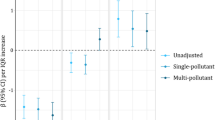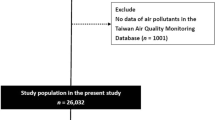Abstract
We aimed to assess the association between exposure to various air pollutants, individually or jointly, and incident kidney stones, and examine whether genetic susceptibility for kidney stones may modify this association. 453,977 participants without prior kidney stones from the UK Biobank were included. Annual mean concentrations of PM2.5, PM2.5–10, PM10, NO2, and NOx were estimated with a land use regression model. A weighted air pollution score was constructed that incorporates the five pollutants mentioned above. A genetic risk score (GRS) was calculated based on 20 single-nucleotide polymorphisms associated with kidney stones. The primary outcome was incident kidney stones. During a median follow-up of 11.9 years, 5,375 kidney stones were recorded. The adjusted HRs (95%CI) of incident kidney stones were 1.04 (1.01–1.07), 1.02 (1.00–1.05), 1.03 (1.01–1.06), 1.05 (1.02–1.08), and 1.04 (1.01–1.07), for per standard deviation (SD) increment in PM2.5 (SD:1.06 μg/m3), PM2.5–10 (SD:0.90 μg/m3), PM10 (SD:1.90 μg/m3), NO2 (SD:7.63 μg/m3), and NOx (SD: 15.63 μg/m3), respectively. Moreover, there was a significantly linear association between the air pollution score and incident kidney stones (per SD increment: HR, 1.05, 95%CI: 1.02–1.08), especially in those without diabetes (vs. participants with diabetes; P-interaction = 0.037). In addition, the association between air pollution and kidney stones was statistically significant only in participants within intermediate-high kidney stone GRS, but not in those with low GRS kidney stone, though the interaction was not significant (P-interaction = 0.385). In conclusion, exposure to air pollution was associated with a higher risk of incident kidney stones, calling for the need to improve air quality.



Similar content being viewed by others
Data availability
The UK Biobank data are available on application to the UK Biobank, and the analytic methods, and study materials that support the findings of this study will be available from the corresponding authors on request.
Abbreviations
- PM:
-
Particulate matter
- NO2 :
-
Nitrogen dioxide
- NOx :
-
Nitrogen oxides
- ESCAPE:
-
European Study of Cohorts for Air Pollution Effects
- BMI:
-
Body mass index
- ICD:
-
International Classification of Diseases
- eGFR:
-
Estimated glomerular filtration rate
- TDI:
-
Townsend Deprivation Index
- UACR:
-
Urine albumin-to-creatinine ratio
- GRS:
-
Genetic risk score
- SNPs:
-
Single-nucleotide polymorphisms
- IQR:
-
Interquartile range
- HR:
-
Hazards ratio
- SD:
-
Standard deviation
- CI:
-
Confidence interval
References
Abate N, Chandalia M, Cabo-Chan AV Jr et al (2004) The metabolic syndrome and uric acid nephrolithiasis: novel features of renal manifestation of insulin resistance. Kidney Int 65(2):386–392. https://doi.org/10.1111/j.1523-1755.2004.00386.x
Bycroft C, Freeman C, Petkova D et al (2018) The UK Biobank resource with deep phenotyping and genomic data. Nature 562(7726):203–209. https://doi.org/10.1038/s41586-018-0579-z
Chen Z, Salam MT, Toledo-Corral C et al (2016) Ambient Air Pollutants Have Adverse Effects on Insulin and Glucose Homeostasis in Mexican Americans. Diabetes Care 39(4):547–554. https://doi.org/10.2337/dc15-1795
Collins R (2012) What makes UK Biobank special? Lancet 379(9822):1173–1174. https://doi.org/10.1016/S0140-6736(12)60404-8
Daudon M, Traxer O, Conort P et al (2006) Type 2 diabetes increases the risk for uric acid stones. J Am Soc Nephrol 17(7):2026–2033. https://doi.org/10.1681/ASN.2006030262
Dhondup T, Kittanamongkolchai W, Vaughan LE et al (2018) Risk of ESRD and Mortality in Kidney and Bladder Stone Formers. Am J Kidney Dis 72(6):790–797. https://doi.org/10.1053/j.ajkd.2018.06.012
Doiron D, de Hoogh K, Probst-Hensch N et al (2019) Air pollution, lung function and COPD: results from the population-based UK Biobank study. Eur Respir J 54(1):1802140. https://doi.org/10.1183/13993003.02140-2018
Dominici F, Peng RD, Barr CD et al (2010) Protecting human health from air pollution: shifting from a single-pollutant to a multipollutant approach. Epidemiology 21(2):187–194. https://doi.org/10.1097/EDE.0b013e3181cc86e8
Eastwood SV, Mathur R, Atkinson M et al (2016) Algorithms for the Capture and Adjudication of Prevalent and Incident Diabetes in UK Biobank. PLoS One 11(9):e0162388. https://doi.org/10.1371/journal.pone.0162388
Eeftens M, Beelen R, de Hoogh K et al (2012) Development of Land Use Regression models for PM(2.5), PM(2.5) absorbance, PM(10) and PM(coarse) in 20 European study areas; results of the ESCAPE project. Environ Sci Technol 46(20):11195–11205. https://doi.org/10.1021/es301948k
Fu Z, Liu Q, Liang J et al (2022) Air pollution, genetic factors and the risk of depression. Sci Total Environ 850:158001. https://doi.org/10.1016/j.scitotenv.2022.158001
Furlong MA, Klimentidis YC (2020) Associations of air pollution with obesity and body fat percentage, and modification by polygenic risk score for BMI in the UK Biobank. Environ Res 185:109364. https://doi.org/10.1016/j.envres.2020.109364
Grossmann V, Schmitt VH, Zeller T et al (2015) Profile of the Immune and Inflammatory Response in Individuals With Prediabetes and Type 2 Diabetes. Diabetes Care 38(7):1356–1364. https://doi.org/10.2337/dc14-3008
Gu J, Shi Y, Zhu Y et al (2020) Ambient air pollution and cause-specific risk of hospital admission in China: A nationwide time-series study. PLoS Med 17(8):e1003188. https://doi.org/10.1371/journal.pmed.1003188
Guo B, Guo Y, Nima Q et al (2022) Exposure to air pollution is associated with an increased risk of metabolic dysfunction-associated fatty liver disease. J Hepatol 76(3):518–525. https://doi.org/10.1016/j.jhep.2021.10.016
Hoffmann B, Moebus S, Dragano N et al (2009) Chronic residential exposure to particulate matter air pollution and systemic inflammatory markers. Environ Health Perspect 117(8):1302–1308. https://doi.org/10.1289/ehp.0800362
Howles SA, Wiberg A, Goldsworthy M et al (2019) Genetic variants of calcium and vitamin D metabolism in kidney stone disease [published correction appears in Nat Commun. 2022 May 30;13(1):3115]. Nat Commun 10(1):5175. https://doi.org/10.1038/s41467-019-13145-x
Huang Y, Zhu M, Ji M et al (2021) Air Pollution, Genetic Factors, and the Risk of Lung Cancer: A Prospective Study in the UK Biobank [published correction appears in Am J Respir Crit Care Med. 2022 May 15;205(10):1254]. Am J Respir Crit Care Med 204(7):817–825. https://doi.org/10.1164/rccm.202011-4063OC
Khera AV, Emdin CA, Drake I et al (2016) Genetic Risk, Adherence to a Healthy Lifestyle, and Coronary Disease. N Engl J Med 375(24):2349–2358. https://doi.org/10.1056/NEJMoa1605086
Kim S, Chang Y, Jung HS et al (2020) Glycemic Status, Insulin Resistance, and the Risk of Nephrolithiasis: A Cohort Study. Am J Kidney Dis 76(5):658-668.e1. https://doi.org/10.1053/j.ajkd.2020.03.013
Levey AS, Stevens LA, Schmid CH et al (2009) A new equation to estimate glomerular filtration rate [published correction appears in Ann Intern Med. 2011 Sep 20;155(6):408]. Ann Intern Med 150(9):604–612. https://doi.org/10.7326/0003-4819-150-9-200905050-00006
Littlejohns TJ, Neal NL, Bradbury KE et al (2020) Fluid Intake and Dietary Factors and the Risk of Incident Kidney Stones in UK Biobank: A Population-based Prospective Cohort Study. Eur Urol Focus 6(4):752–761. https://doi.org/10.1016/j.euf.2019.05.002
Mauderly JL, Samet JM (2009) Is there evidence for synergy among air pollutants in causing health effects? Environ Health Perspect 117(1):1–6. https://doi.org/10.1289/ehp.11654
Mehta AJ, Zanobetti A, Bind MA et al (2016) Long-Term Exposure to Ambient Fine Particulate Matter and Renal Function in Older Men: The Veterans Administration Normative Aging Study. Environ Health Perspect 124(9):1353–1360. https://doi.org/10.1289/ehp.1510269
Mozaffarian D (2016) Dietary and Policy Priorities for Cardiovascular Disease, Diabetes, and Obesity: A Comprehensive Review. Circulation 133(2):187–225. https://doi.org/10.1161/CIRCULATIONAHA.115.018585
Noh TI, Hong J, Kang SH et al (2021) Association of meteorological factors and ambient air pollution on medical care utilization for urolithiasis: a population-based time-series study. BMC Nephrol 2(1):402. https://doi.org/10.1186/s12882-021-02614-5
Romero V, Akpinar H, Assimos DG (2010) Kidney stones: a global picture of prevalence, incidence, and associated risk factors. Rev Urol 12(2–3):e86–e96
Said MA, Verweij N, van der Harst P (2018) Associations of Combined Genetic and Lifestyle Risks With Incident Cardiovascular Disease and Diabetes in the UK Biobank Study. JAMA Cardiol 3(8):693–702. https://doi.org/10.1001/jamacardio.2018.1717
Shoag J, Halpern J, Goldfarb DS et al (2014) Risk of chronic and end stage kidney disease in patients with nephrolithiasis. J Urol 192(5):1440–1445. https://doi.org/10.1016/j.juro.2014.05.117
Singh P, Harris PC, Sas DJ et al (2022) The genetics of kidney stone disease and nephrocalcinosis. Nat Rev Nephrol 18(4):224–240. https://doi.org/10.1038/s41581-021-00513-4
Siregar S, Idiawati N, Lestari P et al (2022a) Chemical Composition, Source Appointment and Health Risk of PM2.5 and PM2.5–10 during Forest and Peatland Fires in Riau, Indonesia. Aerosol Air Qual Res 22(9):220015. https://doi.org/10.4209/aaqr.220015
Siregar S, Idiawati N, Pan WC et al (2022b) Association between satellite-based estimates of long-term PM2.5 exposure and cardiovascular disease: evidence from the Indonesian Family Life Survey. Environ Sci Pollut Res Int 29(14):21156–21165. https://doi.org/10.1007/s11356-021-17318-4
Sudlow C, Gallacher J, Allen N et al (2015) UK biobank: an open access resource for identifying the causes of a wide range of complex diseases of middle and old age. PLoS Med 12(3):e1001779. https://doi.org/10.1371/journal.pmed.1001779
Sun Q, Yue P, Deiuliis JA et al (2009) Ambient air pollution exaggerates adipose inflammation and insulin resistance in a mouse model of diet-induced obesity. Circulation 119(4):538–546. https://doi.org/10.1161/CIRCULATIONAHA.108.799015
Tainio M, Jovanovic Andersen Z, Nieuwenhuijsen MJ et al (2021) Air pollution, physical activity and health: A mapping review of the evidence. Environ Int 147:105954. https://doi.org/10.1016/j.envint.2020.105954
Wang M, Zhou T, Song Y et al (2021) Joint exposure to various ambient air pollutants and incident heart failure: a prospective analysis in UK Biobank. Eur Heart J 42(16):1582–1591. https://doi.org/10.1093/eurheartj/ehaa1031
Wigner P, Grębowski R, Bijak M et al (2021) The Molecular Aspect of Nephrolithiasis Development. Cells 10(8):1926. https://doi.org/10.3390/cells10081926
Acknowledgements
We especially thank all the participants of the UK Biobank and all the people involved in building the UK Biobank study. This research has been conducted using the UK Biobank Resource under Application Number 73201.
Funding
The study was supported by the National Key Research and Development Program (2022YFC2009600, 2022YFC2009605) and the National Natural Science Foundation of China (81973133).
Author information
Authors and Affiliations
Contributions
Concept and design: Xiaoqin Gan and Xianhui Qin;
Acquisition, analysis, or interpretation of data: Xiaoqin Gan, Yanjun Zhang, Panpan He, Ziliang Ye, Chun Zhou, Mengyi Liu, Sisi Yang, Yuanyuan Zhang, and Xianhui Qin;
Statistical analysis: Xiaoqin Gan and Chun Zhou;
Obtained funding: Xianhui Qin;
Supervision: Xianhui Qin;
Writing-original draft: Xiaoqin Gan and Xianhui Qin;
Writing-review & editing: Xiaoqin Gan, Yanjun Zhang, Panpan He, Ziliang Ye, Chun Zhou, Mengyi Liu, Sisi Yang, Yuanyuan Zhang, and Xianhui Qin.
Corresponding author
Ethics declarations
Ethical approval
The UK Biobank was approved by the North West Research Ethics Committee (11/NW/0382).
Consent to participate
All the participants had signed informed consent.
Consent to publish
All authors read and approved the final manuscript.
Competing interests
All the authors declared no competing interest.
Additional information
Responsible Editor: Lotfi Aleya
Publisher's Note
Springer Nature remains neutral with regard to jurisdictional claims in published maps and institutional affiliations.
Supplementary Information
Below is the link to the electronic supplementary material.
Rights and permissions
Springer Nature or its licensor (e.g. a society or other partner) holds exclusive rights to this article under a publishing agreement with the author(s) or other rightsholder(s); author self-archiving of the accepted manuscript version of this article is solely governed by the terms of such publishing agreement and applicable law.
About this article
Cite this article
Gan, X., Zhang, Y., He, P. et al. Positive association between ambient air pollutants and incident kidney stones. Environ Sci Pollut Res 30, 124067–124077 (2023). https://doi.org/10.1007/s11356-023-31136-w
Received:
Accepted:
Published:
Issue Date:
DOI: https://doi.org/10.1007/s11356-023-31136-w




